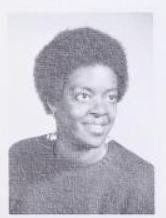Diane Williams ‘72 was a student, an activist, a changemaker, a voice of the Black community and a life-long educator. Williams attended Muhlenberg College from the years of 1968-1972, and passed away in 2014. She was very passionate about the rights of the Black community as it was unjust that Black people were treated as less than or even seen as subhuman. She was such a strong advocate for civil rights that she started the A.B.C. (Association of Black Collegians) where Black students could chat, hangout and discuss the racial makeup of the College.
Williams grew up in Harlem in a brownstone on 122nd Street between Seventh and Lenox avenues with her mother raising her, alongside her aunts and other family members. Growing up, she was strongly influenced by powerful women in her life, which she attributes her own power to. Williams’ mother, Mae, highly emphasized the importance of education. At age three, Williams learned how to read. Then, Williams later attended an all-Black Catholic school in Harlem, the only one of its kind in all of New York City, which prepared her well for college. With her mother’s deep push for education, she learned as much as she could.
Williams was heavily influenced by the civil rights era when she was a child. She wrote in her 2013 blog, “I grew up during the Civil Rights Era. So many of my memories are studded with the fight for equality and justice. As a child I ate dinner while I watched African American youth hosed by firefighters, beaten by cops, and bitten by dogs simply because they wanted the right to vote and have a decent education.”
Williams entered Muhlenberg College from her Catholic school in 1968, and quickly became aware of how predominantly white Muhlenberg was. She was one of six Black students in her year and felt extremely out of place. With that being said, she quickly took to planning and organizing the A.B.C. (Association of Black Collegians), similar to the current Black Students Association (BSA) on campus. During her time as a student, Williams fought for a Black living space/house, a house of their own for Black students to just rest, relax and be their authentic selves. Muhlenberg did not agree with that idea, and instead decided to give the A.B.C. a room at the bottom of Martin Luther (ML) Hall. Williams was furious because Muhlenberg had been the location of many negative experiences for her and fellow Black students, yet the College couldn’t give them a living space of their own.
Williams wanted what was best for the Black students on campus because she knew how important an opportunity at Muhlenberg was for them and herself. She wanted the students to get the best education they could as she firmly believed that education was the best way for Black people to move up the socioeconomic ladder. Williams felt that no one could take your degree away from you because you fought for it, and it exists in the student’s name forever. She praised education to the point where she tutored some of her Black peers so that they could do well in their classes and could continue to succeed.
Many white students and professors would call the Black students racial slurs behind their backs and sometimes would refer to them as such in-person. Some white students would be so hateful to the Black students to the point where Williams had had enough and started writing poetry in 1970 for The Muhlenberg Weekly and speaking out against what was going on. As mentioned earlier, Williams was heavily influenced by the civil rights movement when she was a child, which inspired her to fight against the oppressors on campus.






















